
Olivia Maier
We are here to help your small business grow with the help of one simple tool. That’s right, with one tool your small business can better serve your customers, improve your business processes, and all without breaking the bank.
We’re going to be diving into the powerful business tool known as VoIP. To start, we’re going to be walking you through what VoIP even is, the pricing of VoP systems, and all of the advantages a VoIP system can bring. We then will be talking about how VoIP systems can benefit a small business, before comparing some of the best providers for small businesses. From there we will be discussing some final thoughts including pros and cons of VoIP systems, and answering some FAQs.
If that sounds good to you, then we can’t wait to dive into everything a small business needs to know about VoIP!
Voice over Internet Protocol (VoIP) is a phone technology that lets users make calls over an internet connection. The voice signals are delivered over internet protocol networks, such as the internet. This is an alternative to the public switched telephone network (PSTN) or simply referred to as plain old telephone service (POTS).
You may have heard it called IP telephony, internet telephony, or other alternative names. At the end of the day, terms used to describe internet based phone calls are referring to VoIP systems.
VoIP technology converts your voice into a digital signal, which allows you to make calls from any device that can connect to the internet. This can give your business more flexibility in terms of the devices and hardware that you are required to purchase, as many VoIP systems even allow you to use an existing mobile phone with VoIP access through an app.
Many businesses looking for a new phone service provider are making the switch from traditional phone lines to a VoIP system. That is because a VoIP system is able to provide additional services and benefits beyond what a traditional telephone service could.
While we will be diving into different VoIP providers later to give you a cost breakdown, right now we will just be speaking generally. For small businesses, the somewhat variances in overall cost of phone systems could make a big difference in your overall budget.
Generally speaking, hosted VoIP solutions will range from $15-$40 per user, per month. The scalability of these systems are a great perk, as you are billed per user. This means you won’t be stuck with a large overhead cost that varies in value based on the size of your team.
For a landline business phone system from a reliable provider such as AT&T or Verizon, cost will start at $40-$60 per line, per month. Typically it will cost an additional flat rate to increase the number of lines available. You will also have to pay a hefty installation fee if you don’t already have the copper wires that these systems depend on installed.
While your business phone may be a monthly expense, it is a necessary one to provide professional customer service. But, it could be worthwhile to opt for the more affordable VoIP option, especially as you discover the other advanced capabilities that a VoIP system can offer.


What Is the Advantage of a VoIP Phone System for a Small Business?
VoIP providers are often able to provide benefits that include lower costs, higher scalability, improved flexibility, and more. While these lists of advantages can be impressive on their own, we wanted to highlight a few of the things that allow a VoIP phone to provide these amazing benefits to teams.
We’re going to do that by diving into a few of the most significant ways that allows VoIP providers to give your team access to important benefits. One of those is that when compared to a traditional landline phone, your team will be able to see improved processes, savings, and more. We already described the average cost of a VoIP system, but now let’s get into the other benefits associated with VoIP phones and not landline phones.
One of the main differences between VoIP phones and landline phones is how they work in the background. The actual differences in features and functionalities will depend on your actual provider, so generally speaking it is the technology that provides the biggest differentiator.
A traditional landline phone uses analog lines to carry voice signals. Those analog lines are typically in the form of copper wires that are hardwired into your business phone. Your voice travels in small sound waves that are carried into a thin metal disk that is inside your landline phone which converts your voice into electrical energy. The energy is carried over the wires, before being converted back into sound waves for your receiver to hear.
VoIP systems are able to pick up your voice through the microphone of the device that you are using. Your voice generates analog voice signals, which are compressed into packets of data. The VoIP data packets are then transmitted over the internet and then decompressed back to analog voice signals for the person on the other side of your phone call.
For a VoIP user making and receiving calls is done in the same way that it would be with a traditional telephone system. The person on the other end of the call, whether they are using a VoIP system or not, wouldn’t notice any difference as well. This is helpful as it allows businesses to take advantage of this technology without any additional process necessary for users or the receivers of their calls.
The advantages of a VoIP phone when compared to a traditional landline phone is the flexibility and scalability of these systems. You won’t be physically tied down to one location with those copper wire phone lines. Instead, you will be able to access your business phone communications wherever you are, from a wide variety of devices.
You also will be able to take advantage of always up to date technology, instead of those wires that may not have been updated in decades. This is one factor that can help your team and your callers see improved call quality and overall communication.
VoIP phone providers are also able to update their offerings, and typically are continuously doing so. Whether this means offering new integrations as business tools gain in popularity amongst their users, improving existing features, or updating their feature lists, there is always something new right around the corner for your team to take advantage of. The ability to access improved technology and innovations will be a benefit to your team.


Some people will refer to a live (human) attendant that works remotely as a virtual receptionist. However, not every team wants to add a new employee to their ranks, or outsource to a virtual receptionist contact center. That is where a VoIP phone provider can come in with a fantastic advantage for your team. You can utilize your VoIP provider as a virtual receptionist software.
A virtual receptionist software is able to take on the tasks and responsibilities of a live receptionist, without requiring an extra employee to do so. Virtual receptionists are able to field incoming calls, discover customer intent, route calls to the appropriate team members, and more. The best services? Those are the ones who give your team the ability to still have the benefits that come from having a personable and welcoming start to your incoming calls. That is done through features such as welcome messages, canned responses, and more.
For the biggest advantages, look for the following features when searching for virtual receptionist capabilities in your VoIP provider.
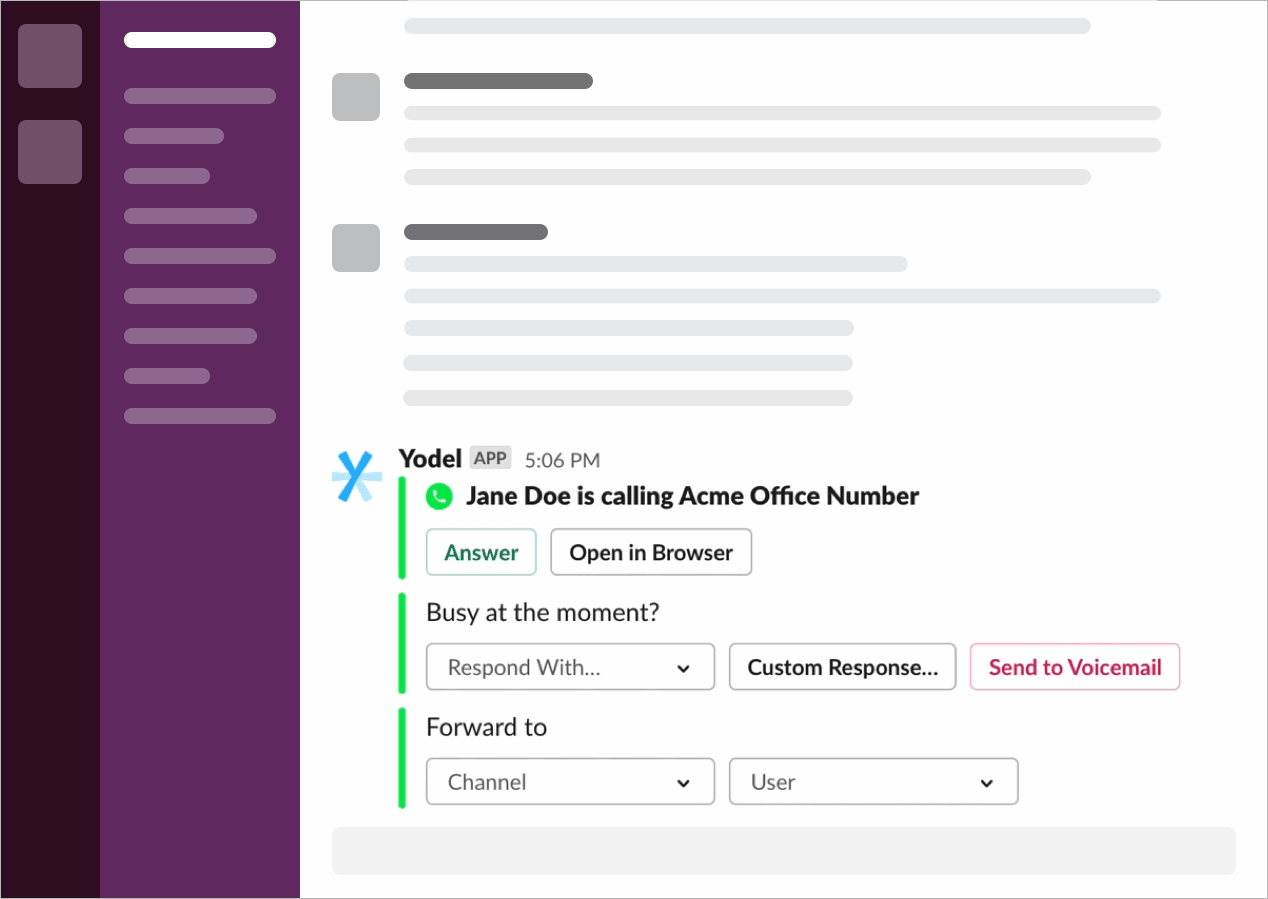
When utilizing a VoIP system, your small business should be able to take your phone communication on the go. That’s why VoIP mobility becomes a huge advantage for your team.
VoIP mobility refers to the ability to use VoIP services while moving from one location to another, without having to disconnect from an active call. One of the ways that a provider is able to offer VoIP mobility is by being able to offer compatibility through mobile devices. Oftentimes that will be an app that your provider will give you access to, so that you aren’t having to use the native phone app.
This type of mobility will allow you to use a smartphone dedicated as a work phone, or to just use your personal phone with an app installed. This can help small businesses save money as they don’t have to buy designated work phones for employees if that isn’t in the budget.
These apps will help you distinguish between personal calls coming into your cell phone, and business calls as it will be a different alert and app. You might even decide to silence your native phone app, while still allowing your VoIP app to ring.
You can then give out your business phone number, not your personal phone number, and still take calls conveniently from your mobile phone wherever you are.
Another great feature that VoIP providers can offer that allows for greater VoIP mobility is called “forward to phone”. A forward to phone feature allows you to start a call on one device, then forward it to your mobile phone if necessary. If you have to suddenly leave the office, have a laptop that is low on battery, or have a different use case, you can simply send your call to your mobile phone without ending it.
This is a seamless feature that won’t leave your caller wondering why there is a gap in the conversation, or why the call suddenly dropped. You then will be able to have the convenience of a cell phone call.
VoIP mobility is great for small businesses as it allows you to employ team members around the globe, remote workers, and in general just allows for a higher degree of flexibility. This is a big business advantage, that doesn’t have to come at a hefty price. Instead, you can just enjoy this benefit while simultaneously taking advantage of all the other great features of a VoIP phone.
Conference calling is an essential part of business phone communication. Especially as teams work remotely, it can be an important tool that can help your team come together.
Conference calls are a reliable and secure way to connect with multiple parties. This can include having multiple team members connect with a client, bringing multiple clients together for a joint meeting, or just synching your team up together to get on the same page.
Having internal conference call capabilities is essential for small businesses. This is a simple way that can help your team “measure twice, cut once” as they work through different problems. By facilitating collaboration between team members and departments you are able to minimize misunderstandings that could easily happen if communication only occurs through a long email chain.
With the convenience of conference calling being a clear advantage, you want to make sure that your VoIP provider gives you access to conference calling capabilities. Don’t worry, any reputable VoIP provider will ensure that your team is able to benefit from conference calling in an easy and effective way.
Call monitoring systems are quickly becoming a must-have feature for every business phone system.
Call monitoring software allows your business to listen to, record, and analyze the calls that your team is making. Call monitoring systems are a collection of business phone features that when added up can create an effective way for teams to better manage their calls. The technology can be broken down into a bunch of individual features, but as a collective they all work together to help further your ability to manage your calls, improve your customer service capabilities, and keep track of important business information.
Call monitoring systems should involve call recording, call commenting, call whisper, and a live activity feed. These essential features can help push your business over the edge and become highly effective at call management.
VoIP call monitoring systems, especially when they are cloud based, will give you an easy way to store and find your call information such as call recordings. Your internal storage space won’t be slowed down or overused trying to keep track of everything. You can also take advantage of the most up to date version of these essential call monitoring features.

While the pricing and advantages of a small business VoIP system are great, there are even more reasons for why your small business should be taking advantage of this technology.
Business VoIP systems are able to offer a high quality voice calling system that comes equipped with features and functionalities that will improve your business communication processes. This means that you can offer improved customer service, efficient internal communication, and more.
Customer service should be on the forefront of your mind as a small business. SMBs are known for being able to give a personalized touch that large enterprises just don’t seem to. One of the best ways to do that is to have a high quality phone system in place.
WIth a high quality phone system, your customer service capabilities will soar. Connect to your CRM so that you can easily find and file away important information. Offer business SMS texting so that you can communicate with your customers in the best way possible. Seamlessly route calls before enjoying crystal clear call quality.
When your team members have the right tools, such as smart business applications, you will be better positioned to give a positive experience. One of those tools should be an intelligent business VoIP phone system.
Having a VoIP system by your side will make a big difference in the level of customer service that you can provide. Enjoy this big benefit alongside all of the pricing and other advantages that we have spoken about so far.

With the right VoIP provider on your side, your SMB can experience fantastic growth. That is because the right VoIP provider should help your business improve your customer experience by providing seamless, personalized, and effective phone communication.
Customer service is important for your business growth as it allows you to increase your customer retention, extract more value from your existing customer base, cultivate a loyal following, and increase organic word of mouth referrals. As many businesses know, customer retention is often cheaper and more valuable than customer acquisition.
However, one of the pain points that can lead to your SMB losing valuable customers is ineffective customer service. This includes customer service activities that occur over the phone. With the right VoIP system by your side, your team will be able to address customer needs and concerns in the most effective way possible.
This is because your team will be able to:
These improvements in customer service will go a long way in helping your small business grow. This is also on top of all the other advantages and benefits that we have already discussed. With the right VoIP system by your side, you should be able to see improvements in customer service and reap the benefits in terms of growth.

As you walk through different VoIP providers and view our analysis, we wanted to make sure that you had these key things in mind. While your individual needs as a small business will vary, having a framework to work off of will help you establish your list of “must have” traits that a provider must have. We understand that selecting a provider may seem like a daunting task, but as you will see, if you keep the right things in mind then you will be able to find the perfect provider for your business.
There are many different types of virtual phone systems, which are also known as VoIP solutions. There are both on-premise and cloud based options available for teams to choose between.
An on-premise solution means that your business would be hosting all of the necessary servers at your physical location. This can come with a lot of maintenance and overhead expenses, and is really only feasible for large enterprises with the means and space to host these bulky servers.
With a cloud based solution, you are taking advantage of servers that your provider is hosting for you. That can help reduce associated costs, and you won’t have to worry about the logistics involved in maintaining the associated infrastructure.
While VoIP technology in general is a great way to take advantage of next-generation tech, a cloud system helps you avoid the significant expenses that come with an on-premise solution.
Cloud phones can provide a long list of benefits for your team. Not only can you access next generation features, and crystal clear voice communications, but you can also unlock the following benefits:
No matter what type or style of business you are running, it just makes sense to make the switch to a cloud based virtual phone system.
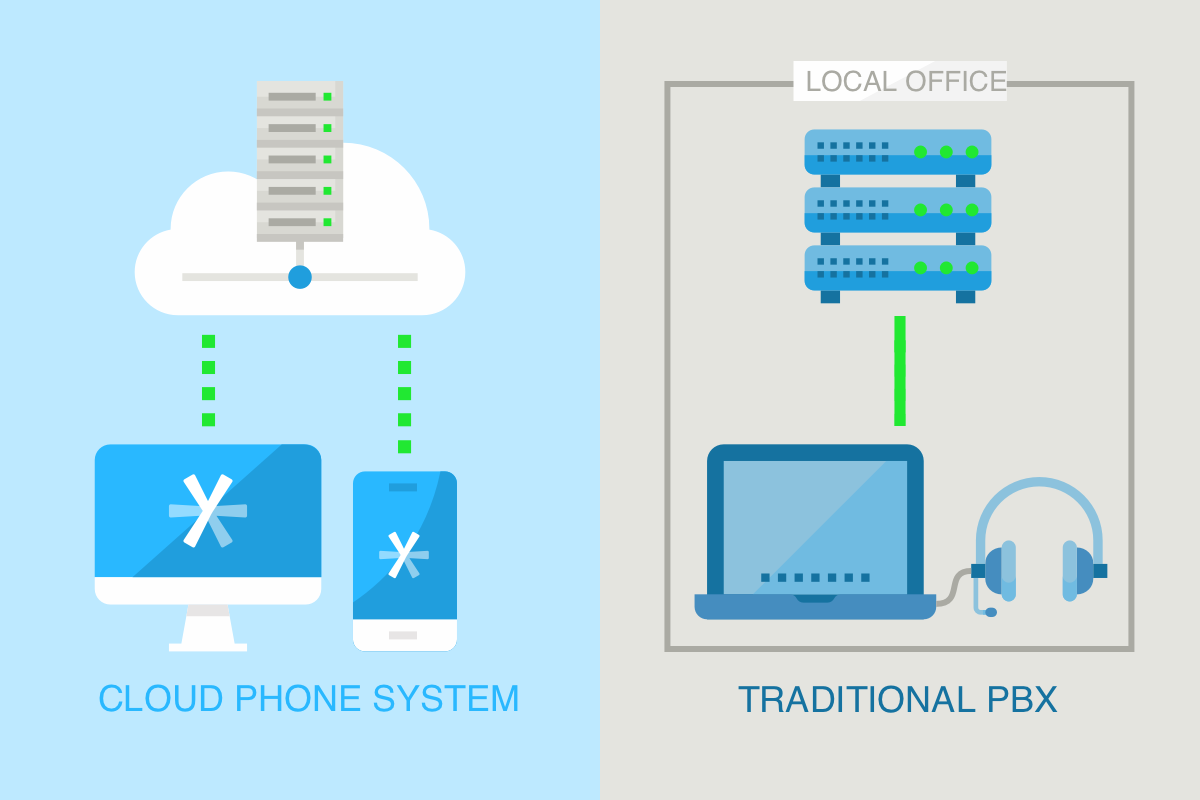
As a small business one of your goals may be to grow your business, now or in the future. Keeping all of your business tools scalable is essential, as it helps you avoid being locked into a plan that is overpriced for your current business needs. Finding the right size tool might seem tricky across all business tools, but especially so when choosing a business phone provider.
However, one of the benefits that all VoIP providers should be able to give your team is the ability to pay a price per use, so you are only charged the appropriate amount for your team’s size. However, this isn’t the only way that your phone system should be scalable. You should avoid phone providers who will lock you into a set number of users or parallel calls. This will add an unnecessary barrier that can make it harder to grow. You should also look for providers that can give you access to numerous phone numbers. While you may not think it is necessary right now, if you were to expand locations, or want a virtual phone number for a different global region, you should have the ability to get that phone number from your provider.
Typically cloud-based phone systems will allow you to scale your phone plan as needed, making it a more flexible option for small businesses.
When you’re looking for a business phone solution, you should identify the capabilities and features that you wouldn’t want to live without. It can be as simple as having a unique business phone number, or as technological as having automatic call transcriptions. Make sure that all of your bases are covered in terms of the essential features that any phone system should have. That includes having a working voicemail, call logs, and more.
For a small business, we recommend looking for features that give you the advantages of a larger team, without needing to expand your personnel. For example, a virtual receptionist like we talked about above can help improve your phone experience, without having to hire a live receptionist.
The best way to discover the functionalities that your team would want to take advantage of is by asking. Consider having a meeting where you go through different providers to see what is offered, and note which features your team thinks would be beneficial to have. From there you can piece together what a “perfect” phone solution would look like.
Another way to tease out the essential functionalities is to take advantage of a demo call. If you are able to bring a list of “phone pain points” that your team has experienced, an agent for a potential provider should be able to speak to the functionalities that they offer that could help solve your team’s problem.
Small business tools shouldn’t be overly complicated to adopt, or a pain to use. Your team shouldn’t have to feel like they are technology wizards in order to use your VoIP system. Make sure that the actual phone system, whether it be through a virtual dashboard, app, or other software, is easy for your team to take advantage of.
An easy way to make sure that your business phone works for your team is to find out the tools that your team already loves to use. From there, you can search for providers that are able to integrate into those business applications and tools. Integrating your business phone into software and tools you already are using will help maximize the return from each of those tools, as well as consolidating the tools you need to have open and running. It also will ensure that there isn’t a steep learning curve, as your team will already be familiar with some of the processes.
Another important consideration in terms of your business style is finding out how your small business prefers to handle phone communication. Some teams prefer hardware phones, software integrations, or mobile options. If your team prefers a hardware phone, look for SIP integrations so that your team still has the same feel and hardware without the burden of the landline wires. Also check for different apps and other methods of connecting your business phone to the devices your team prefers to use.
With many systems offering similar baseline features, it can be helpful to see where there is added value with different providers. This added value could come in a couple different forms, such as ebooks, a blog, webinars, live onboarding and training, etc. In general, you should have access to the resources necessary for your team to succeed.
Identifying which of these value added options your small business may take advantage of can help you further narrow down your list of potential providers. You can generally find some resources on the provider’s website, which will give you an idea of what is typically available. If you are looking for something specific such as a live demo call to walk through the product, then we suggest reaching out to the provider to find out if that is available.
If there isn’t an easy way to get in touch with your potential provider, then that might indicate how big of a priority adding value through helpful resources is. In general, the providers who are more communicative with you and your team at the earlier stages of the process will be the same providers who are more available to help if you become a paying customer.
Traditional phone providers don’t really offer a way to try their product without some sort of a commitment. However VoIP providers are often able to offer some sort of trial period for your business.
The best way for your business to figure out if a phone system will work well for you and your team is to test it out yourselves. As helpful as different guides and websites can be, there is nothing that will work as well as testing it out. This will ensure you that when you do commit to a provider and make that investment that it is an investment you won’t regret.
Some providers like Yodel go as far as to offer a free trial with no credit card needed to get started. This can help you test out a system to determine if it is the right fit for your team and business needs. Don’t settle for a system that doesn’t give you the chance to test it out before you commit.

Now that you know the advantages that a VoIP service can bring a small business, and some of the considerations you should be looking at when selecting a provider. With all of these things in mind, we now are going to turn to some of the top VoIP providers. We will be reviewing them and including information about the pricing, integrations, and other important factors that you should know. For more information about any of these providers, visit their websites and learn more.
Yodel is a robust business phone system that comes complete with advanced features. The best part? You don’t need to be a technology expert to take advantage of them. They are able to easily meet the “easy configuration” component as they provide a wide range of resources to get started. Yodel’s system is accessible from mobile devices, tablets, desktop computers, laptops, and even hardware SIP phones.
You will never have to worry about inadequate support, as the resources that are there to help you get started are available throughout your time with Yodel. As far as pricing goes, Yodel offers two different plans, Premium and Premium Plus for your business to choose from. The Premium option will cost your team $25/user/month, while the Premium Plus plan will cost $35/user/month. One of the key differences is the ability to take advantage of advanced integrations and concierge phone support options.
Yodel is able to provide a wide range of virtual phone numbers, and can even get you set up with international virtual options. Yodel is a complete business phone system, with voice based intelligent IVR, business SMS texting, and a plethora of integrations. These integrations range from helping your team keep track of everything within Slack, connect to your favorite CRM tool, and more. Whatever business tool your team is using, it is very likely that there is a way to connect it with Yodel.
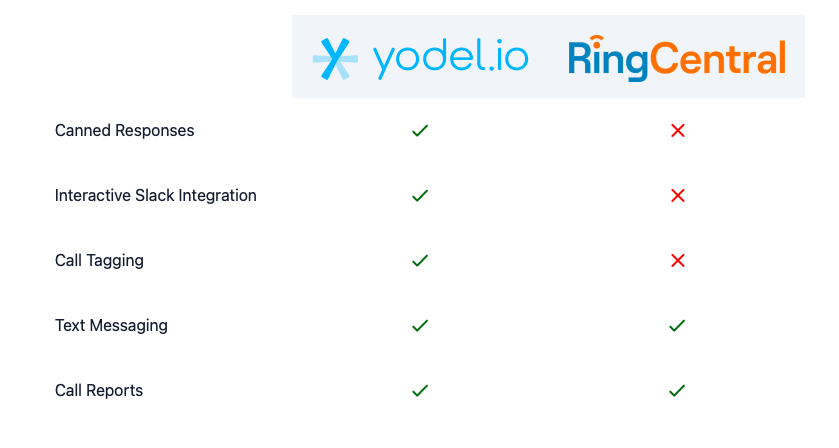
RingCentral is a great solution that is able to check many of the business VoIP boxes, including the basics and next generation features. However, their pricing may cause issues for certain teams. RingCentral pricing depends on the range of employees using your system (1, 2-20, 21-50, 51-99, 100-999+), and then what features you want to have included. That means that the Essentials plan will cost a different amount for businesses of different sizes. This can make the system a little trickier if your business is planning on growing, downsizing, or just aren’t sure what your team is going to look like in the future. The inconsistent pricing can lead to issues in budgeting, but it may not be a big issue to some teams.
RingCentral allows for a limited trial, with a maximum of five users and two desktop phones. This does allow you to test them out before you commit, but the whole team may not be able to experience and weigh in with their feedback.

With Nextiva, you’re able to take advantage of unique offerings such as the ability to buy or lease phones and other hardware. While VoIP is known for being flexible enough for you to access your phone communication from any device, this could be a good way to use hardware phones if that is your business preferences.
Nextiva has a wide range of pricing available, which is billed per user per month. However, the price per user will adjust if you have more members on your team. As a small business, you are likely to pay the following prices to take advantage of Nextiva. For their professional plan, you will probably be looking at around $28/user/month. There is also an enterprise plan that is around $38/user/month that is available to be selected.
Nextiva is a communication system that offers features such as unlimited calling, internet faxing, voicemail transcription, and more. It appears that some of the collaboration features might be a little less extensive than other options, but it is worth exploring Nextiva’s features to figure out if they are able to meet your needs.

Grasshopper is often seen as an excellent choice for businesses with 1-15 employees. While this may make scaling an issue in the future. However, if your SMB fits that profile, Grasshopper may be a great fit.
In terms of pricing and overall phone plans, Grasshopper does something interesting, which is including add-ons in an a-la carte style. Their “add ons” include things we consider to be essential, such as enabling international calling capabilities. You should make sure to check which features from their “add ons” list you consider to be essential, as this will significantly impact pricing. The free 7 day trial will give you exposure to the various features they are able to offer, which may help your team determine what would need to be added on and which features you can live without.
Grasshopper can give you access to a toll-free, vanity, or local phone number. They are able to port your existing business phone number, if you’d like to keep the number you are already using. You can get started today with a free 7 day trial.
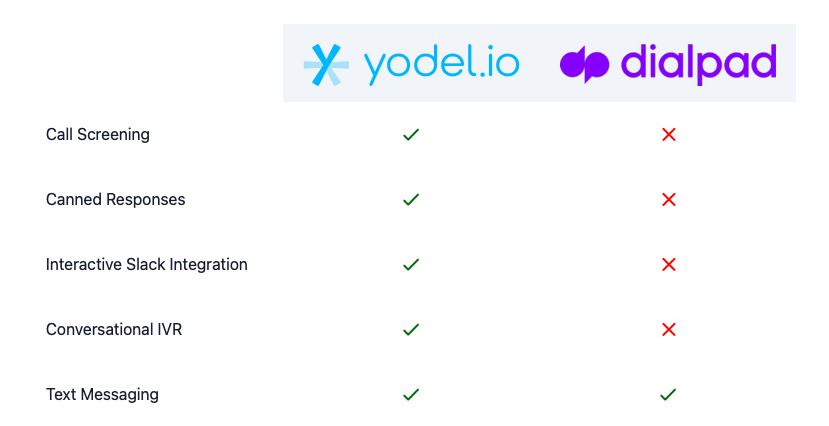
When you are getting started with Dialpad, there are some support and configuration options. It appears that their top support channel is their 24/7 live chat. It doesn’t appear as though you can schedule a demo call, but that may be an option once you are an existing or trailing member. You are able to take advantage of Dialpad from a mobile device, or hardware phone.
Dialpad has a range of pricing options, but be careful because their pricing drastically changes the smart integrations available. The base price plans will come with G Suite and Office 365 integrations. However, if you want to integrate into your CRM and other business apps, it looks like you will need to pay for one of their higher end options. When looking at Dialpad and the final pricing, make sure that you are considering the tools that your team already has and is taking advantage of. If you want to see the advantages that can come with integrating your phone, you may be forced to pay a higher price.
It appears as though DialPad is able to offer virtual phone numbers, but their international phone number options were a little bit limited. It also appears that Dialpad can port your existing number, however on reliable review websites such as G2 it appears that the porting process has not been seamless for everyone. However, Dialpad is able to offer business text messaging, which as we’ve said can help open up a new channel of business communication.
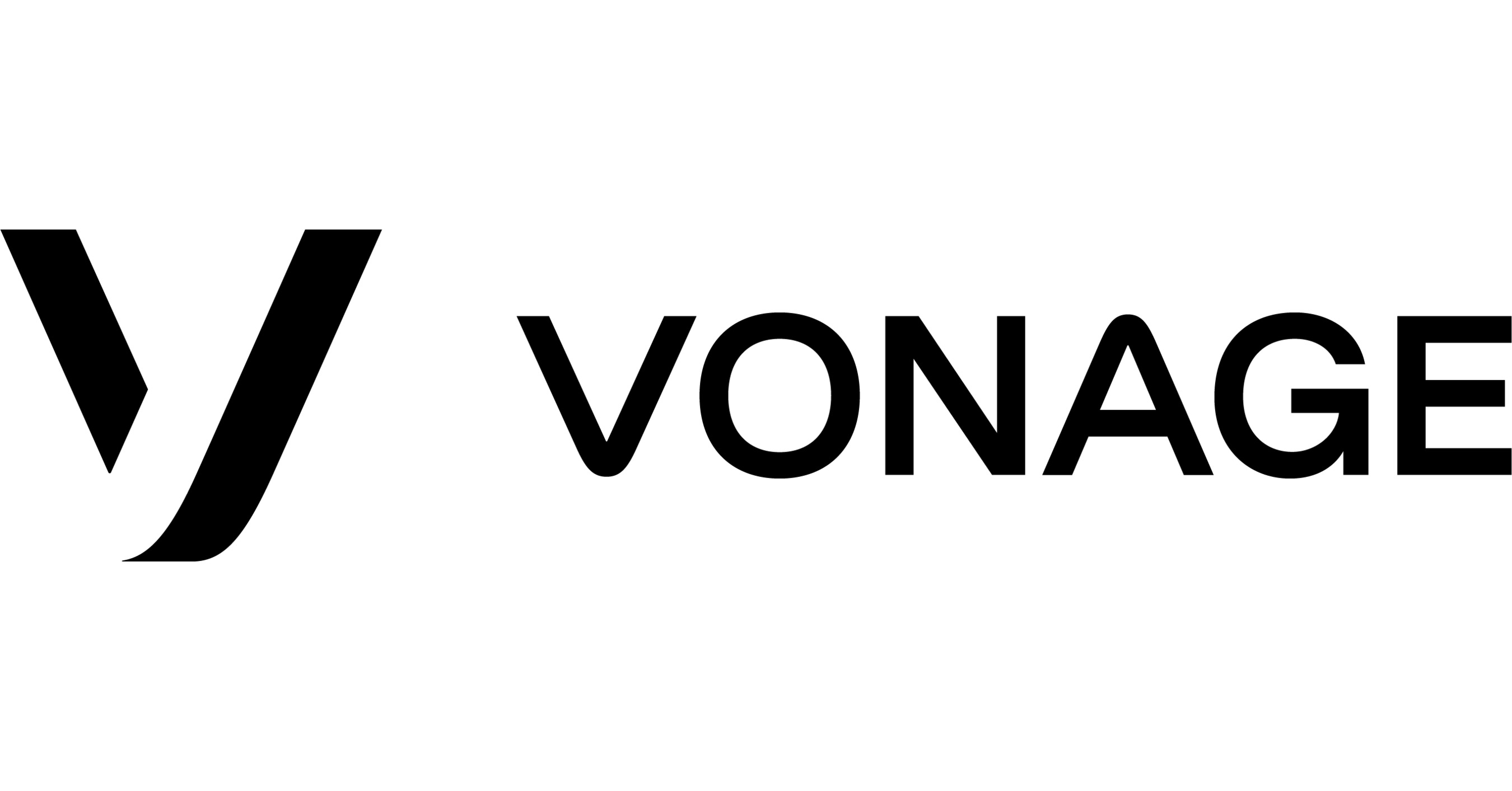
Vonage’s cloud based VoIP services enable international calling, and is supported in over 40 countries. You can take advantage of over 20 different integrations, including Microsoft Office 365 and G Suite. If you are interested in video calling as well as message and voice, then Vonage may be an excellent choice. It appears to be a simple to use platform, with the ability to add on services. If you want you can increase your plan so that you can take advantage of features such as toll-free numbers, voicemail transcriptions, advanced integrations, and more.
The pricing of Vonage is a little different than other VoIP providers, as it is based on a set price per line per month, instead of being per user. The most basic level starts at $15 per line/month, while the advanced level goes up to $40 per line/month. Vonage has a free trial available where you can test out their system for 14 days for free.
It appears that the only contracts available lock you in for a year, so it is important to test out Vonage and make sure this is the right solution for your team.
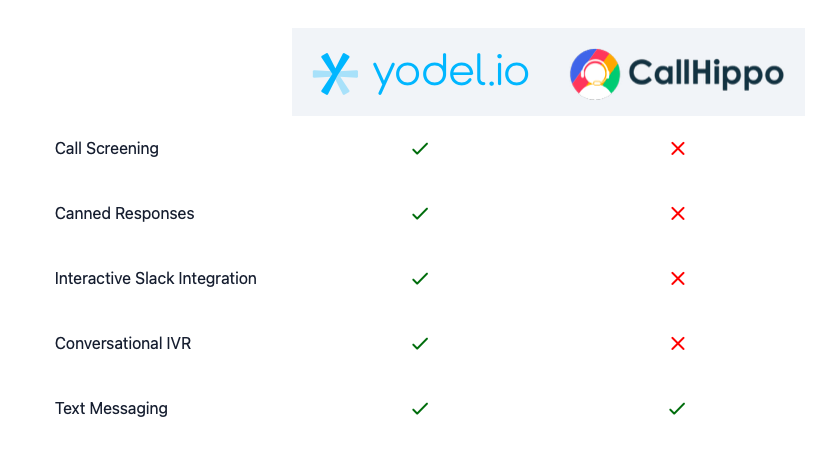
While a somewhat popular option, we don’t think that CallHippo meets the bare minimum benefits of a cloud phone system. This may sound harsh, but CallHippo HEAVILY relies on a-la carte pricing to the point where their basic phone system really doesn’t provide much. When we say a-la carte pricing, it means that there is a simple base plan that you can adopt. However, individual features including some essential features may be available for a small additional price. However, when you start adding on new features, your expected cost will increase significantly. This can lead to a frustrating onboarding process, as you realize new features you may want, only increasing your cost.
Just to show you a few key features that are missing, did you know: CallHippo doesn’t allow you to connect to your hardware SIP phones? This means that if you already have hardware phones that you have bought, and that your team has loved, you won’t be able to continue to use them. CallHippo also appears to be missing even some of the most basic collaboration features, such as call whispering. These are functionalities that can’t even be added on!
If you do want to check out CallHippo, they do have a free trial where they MAY be able to help you determine which features you need before you get started, for a hopefully less confusing process. However, we really do feel that this overly complicated pricing structure will just lead to a disappointing outcome.
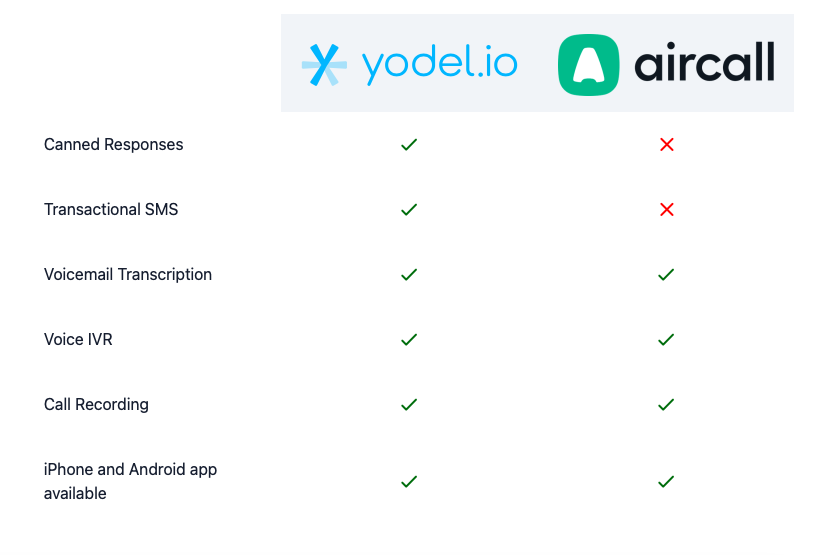
When you are getting started with Aircall, you are able to take advantage of their live resources making it an easy to configure solution. Aircall appears to be compatible with most hardware solutions, and will provide business texting. Their IVR system does not appear to be fully conversational, and instead relies on multi-level IVR routing configurations to be most effective. This may be a bit tricky to set up, and doesn’t eliminate the annoyance of listing to long menu lists. This means that as far as an auto-attendant, or virtual assistant goes, Aircall may not be a perfect solution. If you have a traditional receptionist, or aren’t interested in adopting a virtual receptionist, then this may not be an issue for you.
Aircall is consistently one of the most expensive VoIP services in the top rankings, which makes it not a great fit for many businesses. It is important to look at pricing for all solutions, but with Aircall make sure that you are really getting more with the increased pricing.
However, their entry plan will allow for integrations with more than 80 CRM and business apps, as well as a lot of other smart features. It seems as though their higher end support requires a more expensive plan to access, but they do have basic support capabilities across all payment plans.

The pros and cons of VoIP business phone systems will vary depending on the provider that you decide to work with. We hope that the above section allows you a chance to look over different providers and identify some of the pros and cons that could come with them.
However, we think that comparing the pros and cons of everything that we have discussed today will be a great way to review all of the information we have shared so far, and to keep everything in perspective.
When you take advantage of VoIP, you will probably be able to see lower telecommunication costs. This is obviously a fantastic pro for any business, but especially for small and growing businesses. There is also an ability to scale your business with ease, as you grow your small business.
Your team will be able to support remote workers and take your business on the go as you utilize multiple devices to connect to your business phone system.
Finally, your team will be able to benefit from features that allow you to improve your effectiveness and productivity while ensuring crystal clear call quality.
VoIP solutions are not always the perfect fit for every business, as you have to have a trusted internet connection available. If your team works remotely, their home offices or working situations must allow them to have access to a strong internet provider.
We think yes! With a VoIP provider by your side, you are able to see many amazing pros. With the only con being a requirement for strong wifi, which many offices and remote offices have, it is hard to see why a team wouldn’t want to take advantage of a VoIP solution.
We hope that you’ve been able to learn everything that you need to know about business VoIP solutions and how they can help you grow your small business.
If you are looking to take advantage of a VoIP solution that is perfect for businesses of all sizes, test out Yodel.io with a free trial today. You can reach our team through individualized demo calls that will make sure that all of your business phone questions are addressed.

We may be biased, but we think that Yodel is the perfect VoIP solution for businesses of all sizes, including SMBs. Our system gives you access to high tech functionalities, while remaining an affordable and accessible business tool.
We love the idea of small businesses using VoIP technology because it allows teams of all sizes to access important phone communication features and capabilities. The added benefit of being highly scalable and flexible is a massive perk, especially for SMBs.